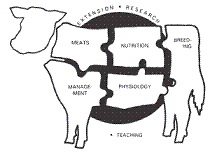Animal Science, Department of

Nebraska Beef Cattle Reports
Date of this Version
2023
Citation
2023 Nebraska Beef Cattle Report
UNL Beef, Institute of Agriculture and Natural Resources, University of Nebraska-Lincoln
Abstract
An analysis of over 9,300 head of cattle and 980 pen means was conducted to evaluate the effect of corn processing, drying distillers grains, oil removal from distillers, and distillers inclusion on cattle performance. This analysis looked at both steam-flaked corn and high-moisture corn or dry-rolled corn or a blend of the latter two grains and their effects on performance with and without distillers grains. Additionally, wet, modified, and dried distillers grains were analyzed as both full fat or de-oiled products at various dietary concentrations with each corn type as the primary cereal grain to determine performance responses. There was an overall improvement in performance when steam-flaked corn was utilized regardless of distillers type or level of inclusion. Feeding full fat byproducts resulted in improved feed conversion compared to de-oiled products, but de-oiled products outperformed control diets with no distiller grains. Economic benefits of feeding distillers grains showed that regardless of corn price and the distillers to corn price ratio, feeding between 5-40% distillers was the optimal cost-minimizing solution, regardless of the type of distillers grains.
Included in
Large or Food Animal and Equine Medicine Commons, Meat Science Commons, Veterinary Preventive Medicine, Epidemiology, and Public Health Commons

